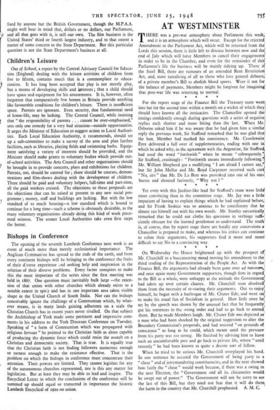Bishops in Conference
The opening of the seventh Lambeth Conference next week is an event of much more than merely ecclesiastical importance. The Anglican Ccrnmun'on has spread to the ends of the earth, and from every continent bishops will be bringing to the conference the fruits of their diverse experience k nd seeking help and inspiration in the solution of their diverse problems. Every factor conspires to make this the most important of the series since the first meeting was held in 1867. One question must inevitably bulk large —the exten- sion of that union with other churches which already exists to a notable extent in spirit and has in one important area taken visible shape in the United Church of South India. Nor can the bishops conceivably ignore the challenge of a Communism which, by what- ever means, is in many lands gaining adherents on a scale the Christian Church has in recent years never rivalled. On that subject the Archbishop of York made some pertinent and impressive com- ments in his address to the York Diocesan Conference on Tuesday. Speaking of " a form of Communism which was propagated with religious fervour " he pointed to the Christian faith as alone capable of producing the dynamic force which could resist the assault on a Christian and democratic society. That is true. It is equally true that the Christian faith is not finding followers numerous enough or earnest enough to make the resistance effective. That is the problem on which the bishops in conference must concentrate their attention. Their powers are limited. They cannot legislate for any of the autonomous churches represented, nor is this any matter for legislation. But at least they may be able to lead and inspire. The Encyclical Letter in which the conclusions of the conference will be summed up should equal or transcend in importance the historic Lambeth Encyclical of 1920 on union.






























 Previous page
Previous page